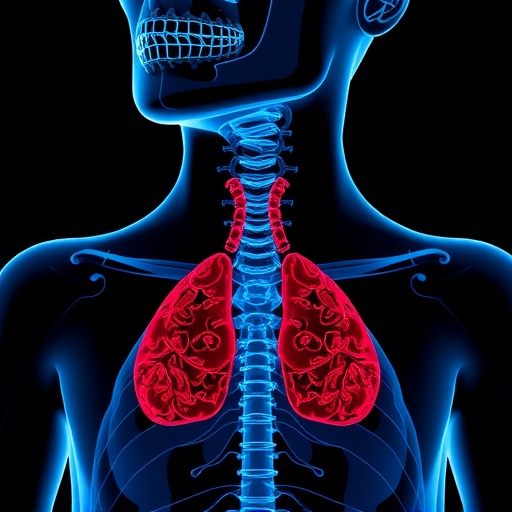In recent years, the advent of immune checkpoint inhibitors, such as PD-1 and PD-L1 inhibitors, has revolutionized cancer therapy, offering new hope to patients battling various malignancies. These immunotherapies leverage the body’s own immune system to mount a more effective response against cancer cells. However, as with any innovative treatment modality, they are accompanied by a risk of immune-related adverse events (irAEs). Among these, thyroid dysfunction stands out as a significant concern, particularly for patients undergoing treatment in a large tertiary center in China.
A recent study published by Gong, Zheng, Liu, and colleagues investigates the risk factors and outcomes associated with thyroid irAEs following the administration of PD-1 and PD-L1 inhibitors. The researchers gathered data from an extensive cohort, demonstrating the magnitude and complexity of thyroid-related side effects in patients undergoing this form of therapy. Specifically, the study scrutinizes the prevalence and types of thyroid dysfunction experienced by patients and seeks to elucidate the underlying mechanisms at play.
Thyroid irAEs manifest in various forms, including hypothyroidism, hyperthyroidism, and thyroiditis. Each of these conditions can dramatically affect a patient’s quality of life and complicate their cancer treatment regimen. The study identified hypothyroidism as the most common thyroid-related adverse event, with incidence rates that raised alarms for oncologists and endocrinologists alike. Persistent or severe thyroid dysfunction may necessitate the initiation of thyroid hormone replacement therapy, which introduces additional considerations into patient management strategies.
In evaluating the risk factors contributing to thyroid irAEs, the authors considered multiple variables, including age, sex, baseline thyroid function, and the type of cancer being treated. Notably, they found that younger patients were at a higher risk of developing thyroid-related adverse events, a revelation that could influence screening protocols for those embarking on immunotherapy. This insight into demographic risk factors is crucial, as it can help tailor monitoring strategies in clinical settings and provide early detection avenues for affected patients.
Moreover, the study also examined how the presence of other autoimmune diseases might predispose patients to thyroid irAEs. The interplay between pre-existing autoimmune conditions and the immune modulation induced by PD-1/PD-L1 inhibitors is an area ripe for further exploration. The authors recommend that clinicians remain vigilant in monitoring patients with a history of autoimmune diseases, as they may face compounded risks when treated with immune checkpoint inhibitors.
In addition to demographic and autoimmune considerations, the nature of the cancer itself may influence thyroid outcomes. Certain malignancies, such as melanoma or lung cancer, may exhibit different propensities for inducing thyroid dysfunction when treated with the same immunotherapeutic agents. This difference underscores the need for personalized medicine approaches in oncology, where treatment regimens are tailored not just to the cancer type but also to the individual patient’s risk profile.
The clinical implications of thyroid irAEs are far-reaching. The presence of thyroid dysfunction can complicate the ongoing management of cancer, as oncologists may need to coordinate closely with endocrinologists to ensure optimal care. The potential necessity of adjusting chemotherapy or immunotherapy dosages in light of thyroid dysfunction can present additional challenges in treatment planning.
Indeed, the study advocates for a multidisciplinary approach, emphasizing the collaborative role of oncologists and endocrinologists in managing patients experiencing thyroid irAEs. A proactive strategy that includes routine thyroid function monitoring and early intervention could serve to mitigate the impact of these adverse events. Such an approach aligns with emerging trends in personalized medicine, wherein treatments are adapted dynamically based on patient response and evolving health metrics.
Understanding the pharmacological mechanisms that underlie thyroid irAEs is also a critical dimension of this research. PD-1/PD-L1 inhibitors function by blocking pathways that prevent T-cell activation, thereby enhancing the immune response against tumors. However, this heightened immune response can also lead to collateral damage, impacting thyroid tissue and resulting in dysregulation. The authors note that ongoing research is essential to delineate the specific immunological changes induced by these therapies and how they correlate with the development of thyroid dysfunction.
As the field of oncology continues to evolve, the importance of educating both healthcare providers and patients about the potential risks of thyroid irAEs cannot be overstated. In light of this study’s findings, the authors encourage enhanced awareness and discussions about thyroid health during consultations for immunotherapy. Patients should be informed about possible symptoms of thyroid dysfunction and the importance of reporting any concerning changes promptly.
In conclusion, the investigation conducted by Gong and his team sheds light on the risk factors and outcomes associated with thyroid immune-related adverse events following PD-1 and PD-L1 inhibitor treatment. Their findings hold particular significance for clinicians, as they underscore the necessity for vigilant monitoring and interdisciplinary collaboration in managing patients undergoing novel cancer therapies. As the medical community continues to refine approaches to immunotherapy, the understanding of adverse events like thyroid dysfunction will be crucial in optimizing cancer care and improving patient outcomes.
The continued exploration of thyroid irAEs signifies a larger trend in medicine, where understanding the full range of treatment effects is essential for advancing patient-centered care. With ongoing research and an increased focus on individualized treatment strategies, the intersection of oncology and endocrinology will likely yield essential insights that enhance patient safety and therapeutic efficacy in the age of immunotherapy.
Subject of Research: Risk factors and outcomes of thyroid immune-related adverse events following PD-1/PD-L1 inhibitors treatment.
Article Title: Risk factors and outcomes of thyroid immune-related adverse events following PD-1/PD-L1 inhibitors treatment in a large tertiary Chinese center.
Article References:
Gong, W., Zheng, E., Liu, M. et al. Risk factors and outcomes of thyroid immune-related adverse events following PD-1/PD-L1 inhibitors treatment in a large tertiary Chinese center.
BMC Endocr Disord 25, 171 (2025). https://doi.org/10.1186/s12902-025-01986-1
Image Credits: AI Generated
DOI: 10.1186/s12902-025-01986-1
Keywords: PD-1 inhibitors, PD-L1 inhibitors, thyroid dysfunction, immune-related adverse events, cancer therapy, personalized medicine.




